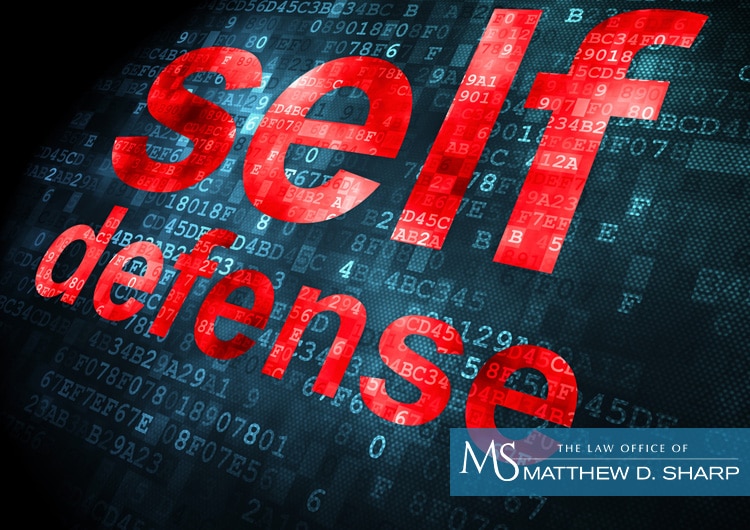Understanding your right to protect yourself, your loved ones and your property

If you have questions about self-defense laws in Texas, you’re in good company.
Texas State Penal Code (section 9.31) states that persons may use force against another party when they reasonably believe that force is needed to protect them against another’s use of force or attempts to use illegal force.
That said, proving self-defense in court poses some challenges. Self-defense may be claimed in certain circumstances, including:
- The individual used only the level of force needed to defend themselves
- The individual needed to use force to stop someone else’s illegal violence
- The person didn’t goad or prompt the other party to use force
- The individual wasn’t in the process of performing criminal activities or committing a criminal act
This article will explain Texas self-defense laws, including the Castle Doctrine and “stand your ground” laws.
Self-defense is a “complete defense” in Texas criminal cases
The laws of Texas state that self-defense is a “complete defense” when the defendant is accused of a crime. The use of force is justified in certain instances in which the individual is permitted to defend themselves. Texas’s Castle Doctrine affords people with the legal right to self-defense when in a private space such as their home or vehicle.
The individual’s legal right to self-defense also applies when they’re compelled to defend their property. Generally speaking, the individual doesn’t need to retreat before using force in self-defense. In short, this is Texas’s “stand your ground” law.
Similarly, the use of deadly force in matters of self-defense is the legal right of Texans in some situations. According to Texas law, each individual’s “home is their castle,” and deadly force may be needed in defense of this protected space.
In addition, Texas’s self-defense laws can apply to the defense of others. Self-defense laws in Texas protect Texans who act in self-protection, the protection of others and/or the protection of their personal property.
In the following section, we answer common questions about Texas’s Castle Doctrine and the “stand your ground” law.
Common questions about Texas’s self-defense laws
The definition of self-defense in Texas is clear. People are allowed to defend themselves, others and personal property when another party uses illegal force. The only legal defense to an accusation of violent crime in Texas is self-defense. If the accused responds that they acted only in self-defense in thwarting or stopping another party’s violent or illegal force, a judge and jury may deem that these actions were justified.
Self-defense is a common defense strategy in certain criminal cases. Among these are assault, manslaughter, murder, and domestic violence. If you have questions about self-defense laws in Texas, contact the Law Office of Matthew D. Sharp in Houston.
When is self-defense a strong legal defense in Texas?
When another party uses violent or illegal force against you in Texas, the law defends your right to self-protection. It also permits you to defend someone else or your personal property when you believe it’s absolutely and immediately necessary.
The laws of Texas require the accused to show that their belief that they needed to protect themselves, someone else or their property was reasonable at that moment. Your reason for using force in a given situation could be demonstrated by causal relationships. For example, if someone beat you with a baseball bat in an attempt to steal your car, you’re permitted to use reasonable force to stop them.
What’s “reasonable” when it comes to self-defense?
Let’s say you’re accused of assault in Texas.
Was someone else actually the aggressor?
You’re allowed to defend yourself against violence in Texas. Texas law allows you to use a certain amount of reasonable force and defines the kind of situations in which you can use force.
In the above scenario, if someone beat you with a baseball bat and you believed at that moment that they intended to cause you serious harm, your decision to punch the attacker or use your fingernails to thwart them may be considered reasonable.
What’s covered under Texas’s Castle Doctrine?
People have the right to protect themselves, others and personal possessions like homes and cars. They have the right to protect their turf at home and at the office. As long as the threatened person doesn’t provoke the attacker or commit a crime (other than a traffic offense), they have the legal right to self-defense under Texas law.
The Castle Doctrine requires the victim to show that their premise (“castle”) was broken into and/or unlawfully entered and/or that the individual was unlawfully taken from their office, workplace, home or vehicle.
Texas’s Castle Doctrine also states that the individual’s self-defense response is “reasonable” in response to serious crimes—for example, aggravated kidnapping, sexual assault, aggravated sexual assault, murder and robbery/aggravated robbery. Reasonable force is also “proportionate” under Texas self-defense law.
Are there any times when the Castle Doctrine isn’t considered in Texas?
An experienced criminal defense lawyer knows the importance of discussing your case to arrive at a successful defense strategy. There are scenarios in which self-defense might not be the best defense strategy. If the defendant used force to resist arrest or in response to verbal prompts, self-defense might not apply under the law even in a scenario in which the arrest was illegal and/or force wasn’t used.
For example, let’s say Ellery verbally insults Arnie, a known adversary at work. Arnie attacks Ellery, and Ellery shoots Arnie as a result. In this example, Ellery used disproportionate and deadly force.
How much force can an individual use under Texas’s Castle Doctrine?
Force, as long as it’s reasonable at the moment and proportionate to the threat, is permitted in self-defense. The amount of force mustn’t be greater than the amount of force used by the perpetrator. The use of too much force is considered a crime in Texas. Matters of self-defense may be viewed as serious crimes.
Consider this scenario:
While a carpenter is working in a client’s home, their 8-year-old son punches the carpenter. In response, the carpenter draws a gun and shoots the boy. This case wouldn’t be considered self-defense since the use of force was disproportionate.
Is deadly force ever considered proportionate force?
Texas law gives people the right to defend themselves, others in harm’s way, their possessions and their private spaces (home, office or workplace). People can sometimes use deadly force when they consider it “reasonable” in response to crimes like sexual assault, robbery or murder. However, there are times when deadly force might be considered disproportionate to the threat, in which case self-defense would not apply and the person could be charged with a violent crime.
What happens if you use force to protect someone else?
The laws of Texas justify the use of force to protect another party when the user believes the person is in harm’s way (for example, when the person is being attacked and can’t defend themselves) or they reasonably believe their intercession is crucial in a life-or-death situation.
Deadly force is justified under Texas law when one person uses it to protect another. For instance, let’s say you see a man beating a woman with his fists in the grocery store parking lot. You rush over and use your own fists to separate them. Your intervention is reasonable, and your use of force is proportionate and appropriate. You stop the attack. Since you used reasonable force to protect another person as a good Samaritan, you wouldn’t be guilty of assaulting the man who was beating his wife.
What’s Texas’s “stand your ground” law?
People have the legal right to defend themselves and their personal property in Texas. If you’re attacked by another person in Texas, you aren’t required to flee from the other party. You can stand your ground under the law. You’re also legally permitted to use proportionate force in self-defense. As long as you weren’t involved in committing a crime or any sort of criminal activity when you used force to stand your ground, you’re legally permitted to do so in Texas.
For example, what if someone brandishes a knife as he approaches you in your own driveway. In this case, you don’t have to run into your home before confronting the person. You can choose to stand your ground in Texas.
What if force was used to protect property in Texas?
In Texas, you have the legal right to protect your property as an extension of self-defense. You may use force (including deadly force) to property your home, your workplace, your office or your vehicle.
Keep in mind that Texas law requires the use of “reasonable” force in the matter. You, as a reasonable person, must believe that force is necessary in response to another party’s illegal use of force. You cannot legally use disproportionate force. Your actions should be proportionate to the other party’s conduct.
What is the burden of proof under Texas self-defense laws?
You must back up claims of self-defense with evidence. After you present sufficient evidence, the prosecutor assigned to the case will try to persuade the court that you didn’t act in self-defense. However, the prosecutor must convince the court beyond a reasonable doubt.
Reasonable doubt is a widely accepted legal standard of proof that means evidence in the case and supporting arguments establish the individual’s guilt to all rational persons.



